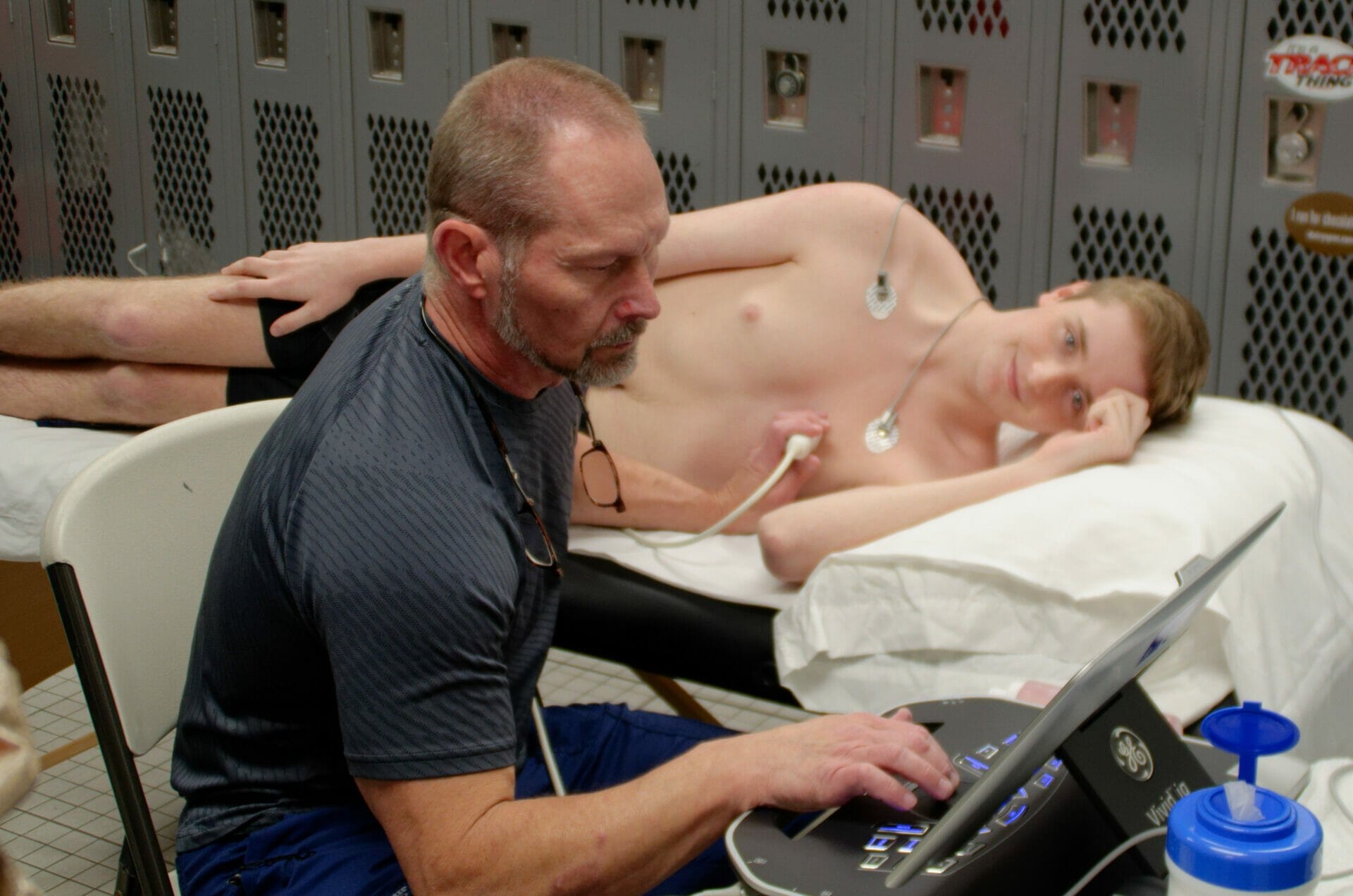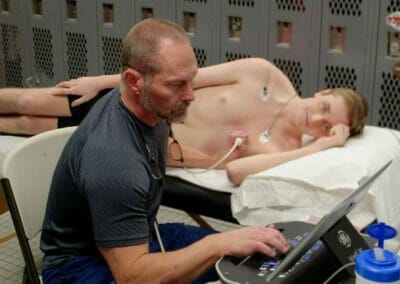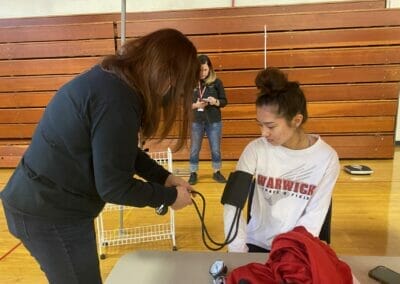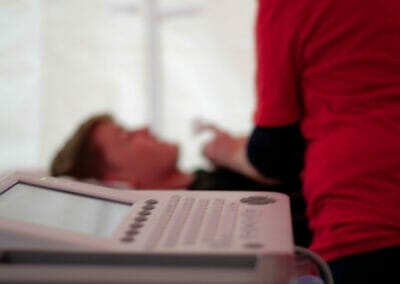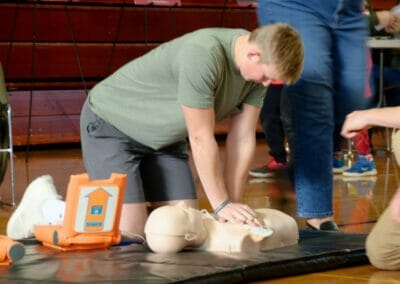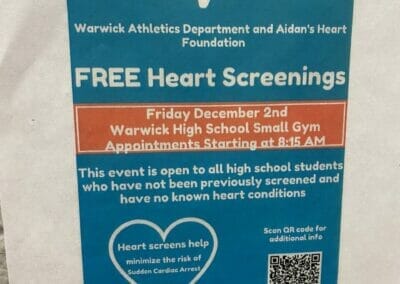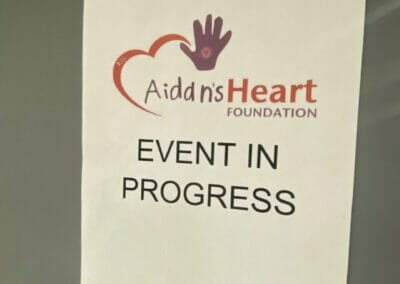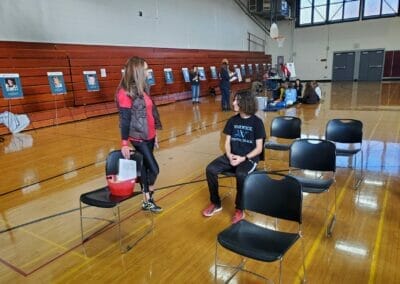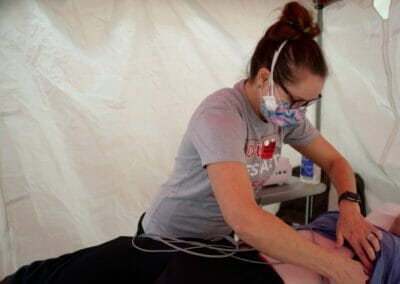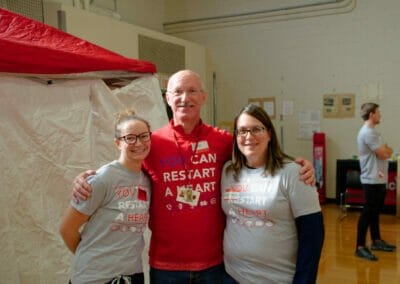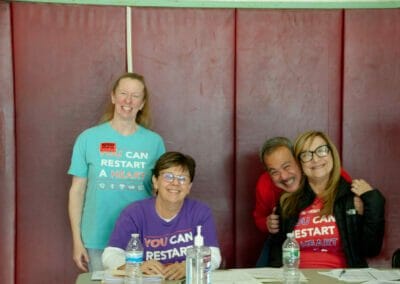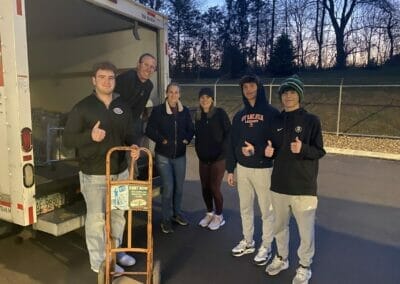“I play basketball and I’ve never had my heart tested before…getting an EKG can tell me something about my heart that I didn’t know about. I’m really glad I’m getting my heart checked today” Jason, 11th grade student, Warwick HS
On Friday, December 2, Aidan’s Heart checked the hearts of 116 high school students (mostly athletes) during the course of a normal school day. Students’ families pre-registered, the kids received a pass to leave class and come to the gym for a quick EKG, and then returned to go about their day. Follow up echocardiogram testing was provided onsite as needed. Parents reserved appointments to discuss their child’s test results by phone on Saturday morning. For the large majority of families, the results were negative.
Across the country, 1 out of every 300 hearts tested is found to have a potentially life-threatening heart condition. At Warwick last Friday, however, the results were much more concerning.
Our cardiology team identified “significant” findings in SIX of the 118 students tested. The life-threatening heart conditions we found, which rarely show symptoms and are undetectable with a stethoscope include: 1 Bicuspid aortic valve, 1 WPW (Wolff-Parkinson-White), 3 Long QT, and 1 Short QT.
Overall, 37 students were referred for followup by a cardiologist; 16 by a primary care physician. Referrals are typically made for a concerning family history, not necessarily an abnormal EKG. PCP referrals are made for on-cardiac related issues such as high blood pressure.
This was our tenth heart screening event since our efforts to check hearts for undetected abnormalities began just 13 months after Aidan’s passing 12 years ago. It marks over 1,900 young hearts checked, resulting in detection of potentially fatal cardiac conditions in nearly 20 kids and teens. EKG testing, which is not yet a standard of care in pediatric protocol, detects up to 70% of the conditions that can cause a seemingly healthy heart to suddenly stop. However, our efforts, combined with those of dozens of grassroots organizations around the country that also perform mass heart screenings, are moving the needle on medical policy. Just this past June, American Academy of Pediatrics updated its screening protocol to include children whose families have a known history of heart issues, or who present with symptoms.
One such “survivor” approached us just this last October, when we were in the thick of planning the Warwick event. Christina, mother of 15-year-old Jane*, came forward to tell us how her daughter was identified with a congenital heart defect at an Aidan’s Heart Foundation heart screening event several years ago. Her daughter is one of three children, and her family has no history of heart conditions. Christina had registered her kids for our event, thinking she’d check the box, be assured of their health, and continue on with their hectic schedules with the assurance that everything was okay. But it wasn’t, for Jane. Over the last several years, her daughter was monitored closely by a pediatric cardiologist, and this past summer, was able to have surgery to correct the problem. Because she was identified and treated, Jane is now able to participate in sports, live a normal life, and be reassured that her heart is safe. Christina is deeply grateful to Aidan’s Heart Foundation for providing opportunities for families to learn more about their children’s heart health, and to arm them with knowledge so that they can take action to prevent tragedy.
This isn’t easy work for anyone involved— for the planning committee, medical staff and the volunteers sitting on one side of the check-in table— or for the teenage students and their families who physically and proverbially walk the path through our examination process. Testing kids’ hearts and knowing with a fair amount of certainty that we’re going to “find something” creates a pretty seismic emotional ripple among those of us who put together these events, despite how firmly we believe in the value of this service. Truth be told, it’s caused us to pause at times, wondering if we’re doing more harm than good by providing these rare opportunities for families to learn more about their heart health. But at the end of the day, the bare truth lies before us: Aidan never had an EKG. Despite 10 days in NICU at the beginning of his life and access to high-quality pediatric care throughout his short little 7 years, his heart was never tested. No family history, no warning symptoms— we never had any reason to assume that anything was wrong. Until it was. And by then, it was too late.
We don’t want it to ever be too late for another family.
Now, more than ever, with what we’re learning about the impact of the COVID-19 virus on young hearts, it’s more critical than ever to get our kids tested.
Talk to your kids about how they feel when they exercise. (Link to questions). Explore and record your family history. Communicate these things to your child’s pediatrician. Learn CPR and how to use an AED. Make sure AEDs are everywhere your child is physically active, and that the people entrusted with their safety are trained in how to use them. And support us: Share our story with your friends, family, and teams and clubs your child belongs to. Donate: Check with your company to see they’ll match your donation. Set up a monthly recurring donation and help us continue to protect hearts all year long. Get involved: Fill out our contact form and let us know that you want to help our organization have greater impact and serve more families.
Because our children deserve better. Their hearts are our greatest gifts. Our kids are WORTH IT.
*name has been changed to protect identity

